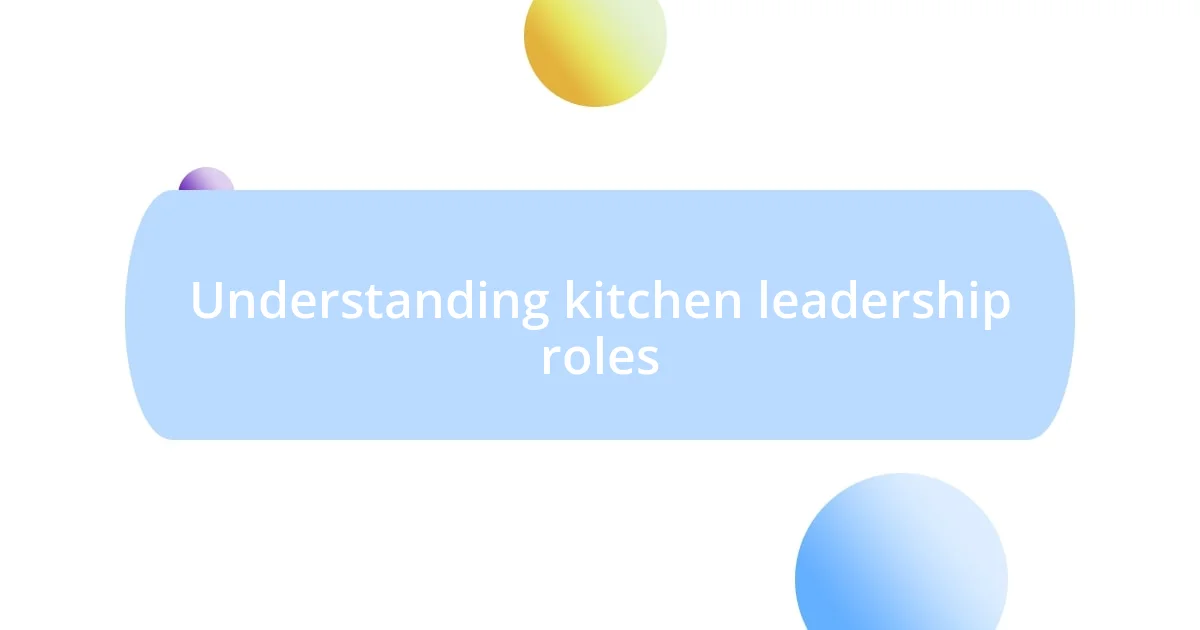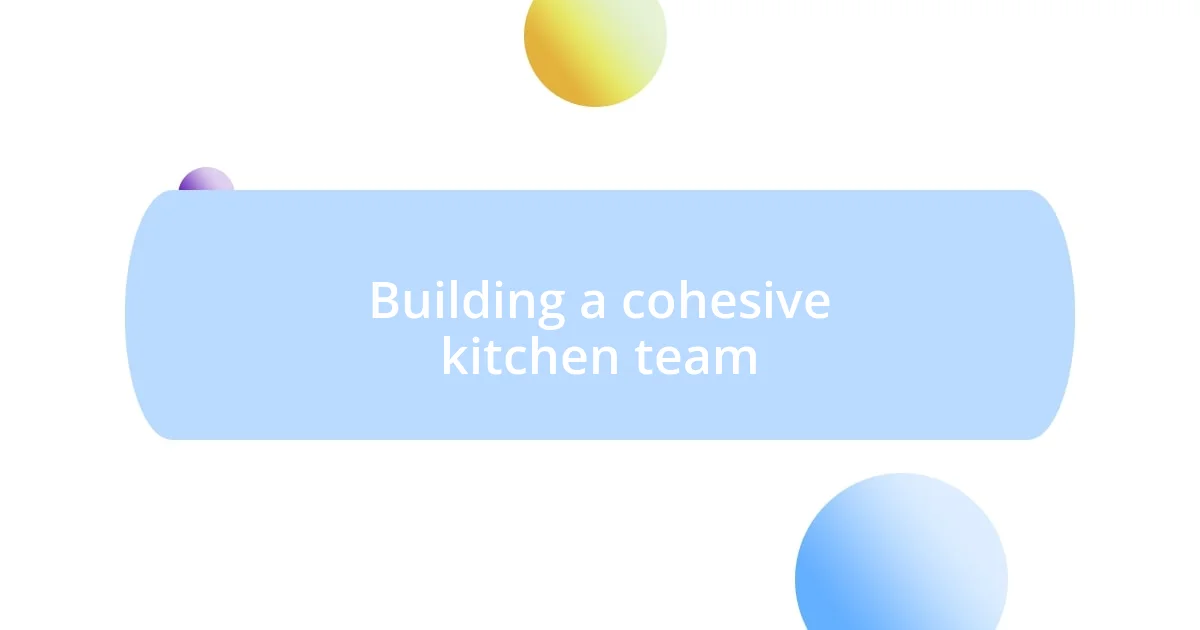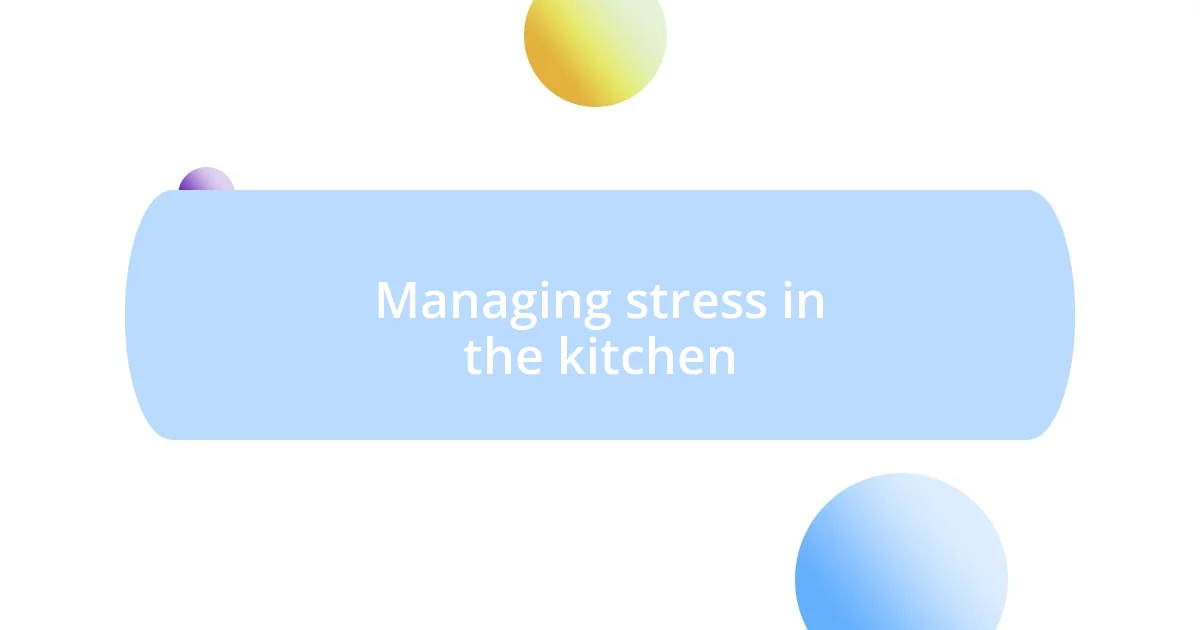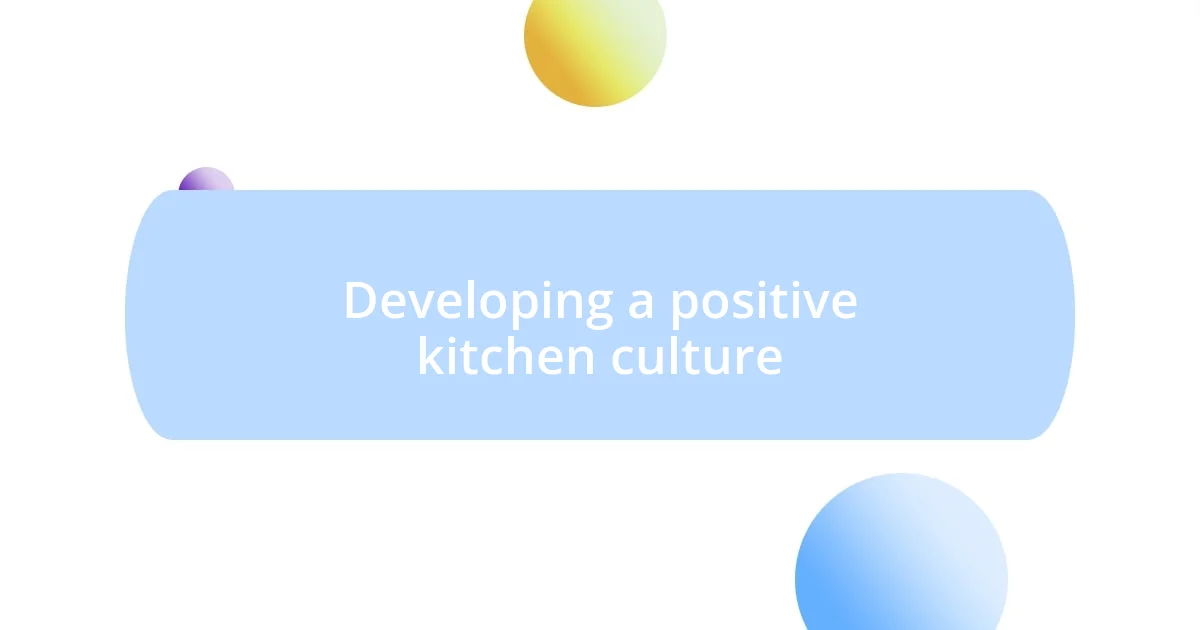Key takeaways:
- Effective kitchen leadership relies on clear communication and emotional intelligence to build trust and cohesion among team members.
- Creating a supportive environment through team-building activities and regular check-ins fosters collaboration and strengthens relationships.
- Leading by example, embracing vulnerability, and practicing patience significantly enhance team morale and performance in high-pressure situations.

Understanding kitchen leadership roles
In the culinary world, understanding the hierarchy of kitchen leadership is crucial for creating a well-functioning environment. I remember my first day in the kitchen as a sous chef, feeling the weight of responsibility for both the team and the quality of the dishes. The energy was palpable, and I quickly realized how each role—executive chef, sous chef, line cooks—interconnected to bring our vision to life.
The executive chef sets the overall direction and tone of the kitchen, often balancing creativity with the demands of business operations. Reflecting on my experiences, I’ve seen how their passion can ignite the kitchen, inspiring everyone to push their boundaries. Isn’t it fascinating how a simple recipe can transform into a culinary masterpiece through the guidance of an effective leader?
Then there’s the sous chef, the backbone of the kitchen, ensuring everything runs smoothly behind the scenes. I recall a night when we were short-staffed; the sous chef stepped up, not just managing tasks but motivating us to stay focused and efficient. Have you ever experienced that moment when a leader’s calm presence makes all the difference in a hectic situation? It’s those instances that truly showcase the essence of kitchen leadership.

Key skills for effective leadership
In my journey through kitchen leadership, I’ve discovered that effective communication is paramount. I vividly recall a chaotic dinner service when a miscommunication nearly derailed our entire evening. By remaining open and encouraging honest dialogue, I helped my team navigate through the chaos. It was an eye-opener for me—communication isn’t just about conveying orders but also about listening to feedback and fostering trust among the team.
Some essential skills that contribute to effective leadership include:
- Emotional Intelligence: Understanding and managing your emotions, as well as empathizing with your team, helps build strong relationships.
- Decisiveness: The ability to make quick, informed decisions is critical, especially when unexpected challenges arise.
- Adaptability: In the fast-paced kitchen environment, flexibility and willingness to adjust plans can make or break a service.
- Mentorship: Investing time in mentoring your team not only elevates their skills but also creates loyalty and a positive work culture.
- Conflict Resolution: Being able to navigate conflicts calmly and constructively can lead to better teamwork and morale.
Recalling the times I’ve implemented these skills—with every triumph and challenge—I feel they form the backbone of an inspiring kitchen leader.

Building a cohesive kitchen team
Building a cohesive kitchen team is all about fostering trust and camaraderie among members. One evening, I watched my team come together during a particularly busy dinner shift. When one of our line cooks dropped a platter just before it was set to go out, there was a palpable tension. Instead of blaming one another, we rallied together, quickly adjusting our rhythm. It was in that moment I realized how vital it is to cultivate a supportive environment—where team members feel safe to make mistakes and learn from them.
I’ve often found that organizing team-building exercises outside of the kitchen can work wonders. Whether it’s a cooking class or a casual outing, these experiences allow everyone to connect on a more personal level. I can recall one event we participated in where we cooked together at a local charity; laughter and friendly competition filled the air. The bonds formed during those moments directly translated into improved communication and collaboration back in the kitchen. It makes you think, right? How much of a difference can a simple shared experience make?
Scheduling regular check-ins is another effective strategy to maintain a unified team. During these meetings, we discuss not only our goals but also individual challenges we face. I remember when one of our newer cooks shared their struggle with a particular technique. Instead of letting them feel isolated, we offered to practice together during our downtime. I was reminded of how essential it is to create an atmosphere where everyone feels their voice is heard and valued. It’s truly the foundation for a cohesive kitchen team.
| Team-building Activity | Benefit |
|---|---|
| Charity Cooking Event | Fosters personal connections and boosts morale |
| Regular Check-ins | Encourages open dialogue and addresses individual challenges |

Implementing effective communication strategies
Effective communication strategies are the lifeblood of any kitchen, especially during high-pressure moments. I remember a shift when we faced an unexpected delay due to a late delivery. Instead of letting frustration simmer, I gathered the team and communicated our plan moving forward. The relief on everyone’s faces was palpable; by being transparent and setting expectations, we could refocus and move forward together. Isn’t it fascinating how a few clear words can shift the mood and energy in a room?
Listening plays an equally critical role. In my experience, one of the best moments came from simply asking for feedback during our weekly wrap-up. I was surprised to learn about a recurring issue one of my dishwashers faced with the new plating system. A small adjustment, based on his insights, not only made his job easier but also improved our overall service flow. This reinforced for me that every voice matters—who would’ve thought that a dishwashing perspective could elevate the entire kitchen’s operations?
Beyond verbal exchanges, I’ve found that non-verbal communication is vital too. I recall a particularly tense service where my sous chef and I barely needed to speak. We locked eyes across the kitchen, and in that moment, we instinctively knew what each other needed. It’s moments like these that underline the importance of trust and familiarity in a team. How often do we underestimate the power of body language? Crafting an environment where these silent cues can thrive really sets the stage for seamless communication.

Managing stress in the kitchen
Managing stress is a critical aspect of kitchen leadership, and I’ve learned that staying organized can significantly reduce chaos. Once, I implemented a pre-shift checklist that my team and I reviewed together. It was surprisingly effective; taking just a few minutes to confirm our game plan added an air of confidence and clarity. Have you ever experienced how a little preparation can really ground you when things get hectic?
Another important method is to encourage mindful breaks during the shift. I recall when we introduced a ‘five-minute walk’ rule, where team members could step outside if they were feeling overwhelmed. The fresh air and brief change of scenery worked wonders in boosting morale. I noticed that those short breaks often restored focus and positivity among us. Isn’t it amazing how taking a moment for yourself can lead to a more productive environment?
Lastly, fostering a culture where laughter is welcome can transform stress levels. I remember a particularly challenging service where stress levels were high, and during a chaotic moment, I cracked a little joke about our ‘fancy’ pasta disaster. To my surprise, laughter erupted, and suddenly, the tension lifted. That moment reminded me of the profound power of humor—how it can reset our mindset and bring us back together, even in the heat of the moment. Doesn’t it make you wonder how a shared laugh can pave the way to teamwork?

Developing a positive kitchen culture
Building a positive kitchen culture hinges on fostering strong relationships within the team. I recall a time when I initiated a weekly team-building exercise, where we cooked a dish together outside of our regular menu. Not only did we bond over the shared experience, but it also sparked creativity in our day-to-day workings. Have you ever seen how a simple activity can break down barriers and strengthen connections? It’s remarkable how those moments of laughter and teamwork can create a sense of belonging.
Another significant aspect is recognizing individual contributions. I remember one of my line cooks, who often went unnoticed. One evening after service, I took a moment to highlight her tireless work to the entire team. The smile on her face that night was unforgettable. Recognition doesn’t just boost morale; it reminds everyone that their effort matters. Who doesn’t appreciate a well-deserved pat on the back every once in a while?
Lastly, I’ve learned that creating an open environment for feedback is essential. During a particularly busy service, I decided to hold a quick debrief afterward, inviting everyone to share their thoughts. The honest conversations that emerged truly surprised me. People aren’t always comfortable voicing their concerns, but when encouraged, it can lead to brilliant ideas for improvement. Isn’t it interesting how a platform for dialogue can transform not just the kitchen’s dynamics but also elevate our collective performance?

Lessons learned from my experience
One of the most significant lessons I’ve learned is the value of patience. There was a night when an order went spectacularly wrong, and instead of losing my cool, I took a deep breath and calmly asked my team what went awry. That moment of patience transformed the situation; rather than placing blame, we focused on solutions. Have you ever noticed how a moment of composure can shift the energy in the room and allow for creativity to flourish?
I’ve also come to appreciate the importance of leading by example. I remember when I was knee-deep in prep, and rather than delegating, I rolled up my sleeves right alongside my team. This small act made a huge difference in morale—watching me tackle the work with them communicated that we were all in this together. It’s incredible how a simple demonstration of solidarity can inspire others to match that energy.
Another profound realization was how critical it is to embrace vulnerability. I recall a day when I openly admitted my mistakes during a team huddle, not only sharing what I learned but also inviting them to do the same. This openness fostered a sense of safety among my team, allowing us all to grow. Have you ever noticed how sharing our weaknesses can create stronger bonds? It’s a reminder that we’re all human, and it’s in those shared experiences that true growth happens.














